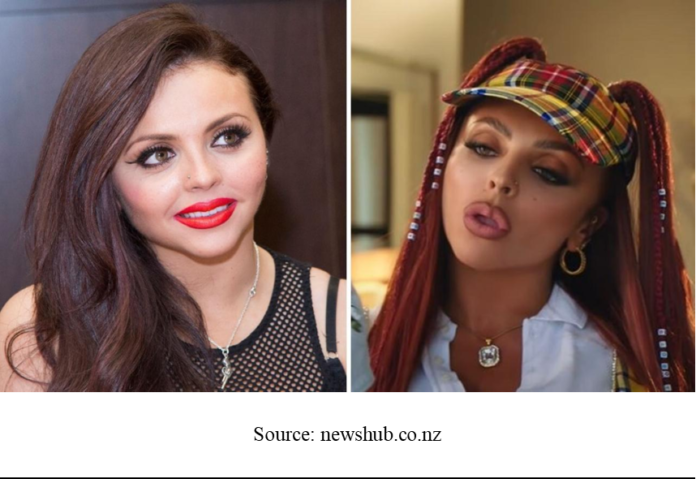By Maler Suresh
Ever since they became the first girl-band to win the X-Factor in 2011, Little Mix has been making history. The British pop group was made up of members Jesy Nelson, Perrie Edwards, Jade Thirwall, and Leigh-Anne Pinnock until 2020, when Jesy left the group to pursue a solo career. Jesy had been cyberbullied and judged harshly throughout her career with Little Mix because her body type wasn’t that of a “normal” pop star. Ever since going solo, she has spoken about the difficulty of her experience in a girl group where all of the members were not only more harshly judged because of their gender, but also constantly compared to each other. She relates the difficulty of not being able to make her own independent decisions. “It’s just the little things like that, that would make me feel trapped”, she said, “And it was just the constant comparison every single day that was hard and that eventually, after 10 years, takes a massive toll on your mental health.”
Jesy is once again facing criticism after the release of her debut-single “Boyz,” but this time, it may be deserved. The song, which features Nicki Minaj and samples P. Diddy’s 2001 hit “Bad Boy for Life,” as well as the accompanying music video, includes some very obvious, but very harmful, stereotypes and blackfishing. Blackfishing is the process of a white woman embodying/borrowing/parroting the aesthetics of Blackness. In the video, Jesy, who is a Caucasion woman from Essex, sings lyrics and emulates an appearance that feeds into the fetishization and appropriation of Black culture. She appears unnaturally tanned in the video, suggesting dark makeup rather than her natural complexion, and wears braided hairstyles. She also fetishizes Black culture with lyrics like “So hood, so good, so damn taboo” and stereotypes “bad boys” in her music video as men who wear basketball shorts and grills or tall tees with hats and durags.
Jesy responded to the backlash on an Instagram Live with Nicki Minaj where she said that it was “never ever” her intention “to offend people of color with this ‘Boyz’ video.” She added, “For me personally, [the] nineties, 2000s hip-hop and R&B, is the best era of music that was made. I just wanted to celebrate that. I just wanted to celebrate that era’s music because it’s what I love.” In an interview with Vulture, the entertainment magazine, she spoke more about the blackfishing accusations, claiming, “The whole time I was in Little Mix I never got any of that. And then I came out of [the band] and people all of a sudden were saying it. I’m very aware that I’m a white British woman; I’ve never said that I wasn’t.”
However, Jesy’s comments ring false to fans who accused Jesy of blackfishing long before she left Little Mix due to her overlining her lips and appearing unnaturally tanned, all of which points to an attempt, conscious or unconscious, to appear racially ambiguous. Additionally, according to the remaining members of Little Mix, Leigh-Anne Pinnock, Jade Thirlwall, and Perrie Edwards, Jesy was also made aware of the harmfulness of the practice while she was still in the group. In an interview with Stella Magazine, Jade Thirlwall said, “We don’t want to talk about the video, or be critical but one thing we will clarify regarding the blackfishing situation is that Jesy was approached by the group in a very friendly, educational manner.” She added, “We don’t really want to dwell, because we have so much to celebrate as a three, but capitalizing on aspects of Blackness without having to endure the daily realities of the Black experience is problematic and harmful to people of color. We think it’s absolutely not OK to use harmful stereotypes. There’s so much to say on that subject that it’s hard to sum up in a sound bite.”
Regardless of her good intentions, Jesy’s “celebration” of Black culture is harmful and cherry-picks palatable aspects of Black culture without acknowledging the lack of opportunity, discrimination, and stereotyping that Black people face. She has been educated multiple times by people of color on the harm that her practices have on communities of color, yet she has continued to defend her actions and release racially insensitive content. As a woman who has, on some level, faced discrimination for an aspect of herself she cannot change and spoken widely about the issue, it is also her responsibility to at least listen to those who are calling for a change in her behavior. Especially when what she is doing is perpetuating the harmful appropriation of another culture.

